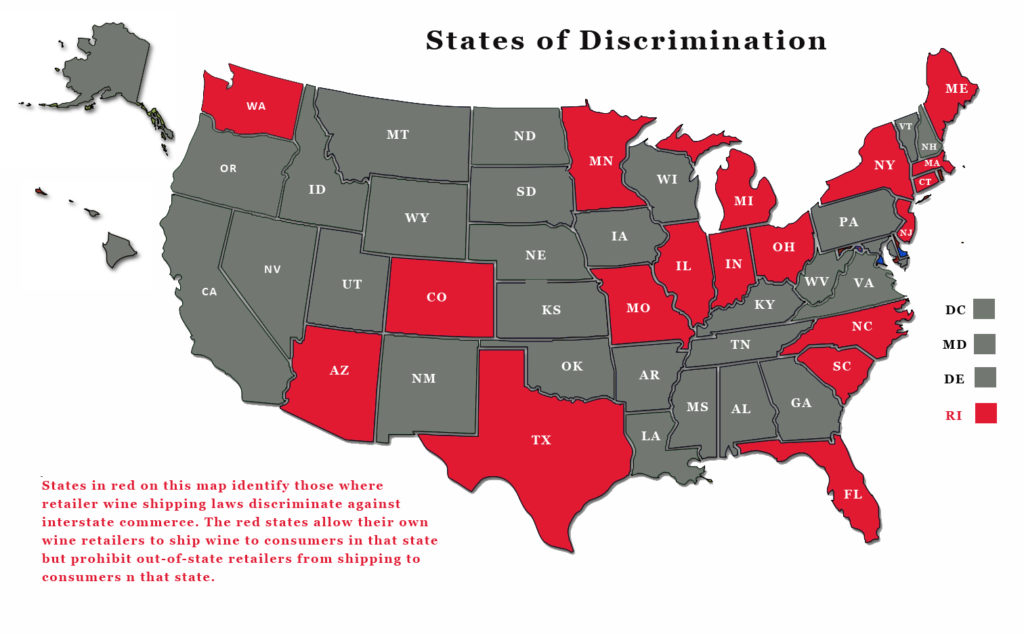The State of Discrimination in Wine

Since the 2005 Granholm v Heald Supreme Court ruling that deemed it unconstitutional for a state to allow direct to consumer wine shipments from in-state shippers but not from out-of-state wine shippers, numerous subsequent court cases have challenged state laws that impact the direct shipment of wine to consumers. Many of these cases have challenged laws that remain on the books that allow in-state retailers to ship wine to consumers in those state but prohibit out-of-state wine retailers do to the same.
These types of laws have been kept in place based on the claim that the non-discrimination principles embedded in the Granholm decision did not apply to retailers, but only wineries.
What is not in question is the constitutional status of a state prohibiting all direct shipment of wine, whether from an in-state winery/retailer or out-of-state winery/retailer. Though extraordinary anti-consumer and protectionism, such laws don’t discriminate against interstate commerce and therefore pass constitutional muster.
Since the Granholm decision, there are no longer any states that allow in-state wineries to ship wine to their consumers while barring out-of-state wineries from doing so. A handful of states prohibit consumers from ordering and receiving shipments of wines from both in-state and out-of-state wineries.
Where retailers are concerned, the very worst states are those that hypocritically ban shipments from out-of-state retailers, while allowing shipment of wine to residents from their own in-state retailers. In every case where this kind of discrimination exits the only rationale for the law is protectionism. It is a case of the state willingly interfering with interstate commerce and restricting their consumers from obtaining the wines they want for the sake of protecting their own retailers and wholesalers. It is the classic definition of legislative “rent-seeking”.
Nineteen states currently fit this undistinguished profile including Arizona, Colorado, Connecticut, Florida, Illinois, Indiana, Maine, Massachusetts, Michigan, Minnesota, Missouri, New Jersey, New York, North Carolina, Ohio, Rhode Island, South Carolina, Texas and Washington State.
It’s notable that the Seventh Circuit Court of Appeals in 2018 ruled Illinois’ discriminatory retailer wine shipping law to be unconstitutional. If this ruling is upheld it would mean that not only is Illinois’ discriminatory law unconstitutional Indiana’s, which is covered by rulings in the Seventh Circuit Court of Appeals.
Likewise, a Federal District Court in 2018 ruled that Michigan’s discriminatory retailer wine shipping law is unconstitutional based on the Sixth Circuit Court of Appeals ruling in Byrd v Tennessee Wine Retailers in Tennessee (now under review by the Supreme Court). If this District Court ruling is upheld as a result of the Supreme Court upholding the Byrd case, it is likely that the discriminatory ban on out-of-state retailer shipping in Ohio will also fall, as its laws are also subject to rulings in the Sixth Circuit Court of Appeals.
Finally, if the Supreme Court’s review of the Byrd case (now commonly referred to as Tennessee Wine & Spirits Retailers Association v. Blair due to a change in the executive director of the Tennessee Alcohol Beverage Commission) determines that wine retailers, like wineries, are protected by the non-discrimination principles laid out in the Granholm case, it is possible that laws in all of the 19 states that currently protect in-state retailers and wholesalers from competition by banning out-of-state retailer shipments and allowing in-state retailers to ship will also have to be altered to become non-discriminatory.
How those laws would be altered is also unknown. A state where its laws are found unconstitutional may be able to conform their retailer wine shipping laws with the Constitution by either banning all shipments from in-state and out-of-state wine retailers or by allowing wine shipments from both.
As it stands now, 50% of the population of the United States lives in states that harm wine consumers by interfering with interstate commerce due to their discriminatory and anti-competitive wine laws that are in place for no other reason than to protect huge middleman wholesalers and in-state retailers from competition.
The Tennessee Wine Retailers v Blair Supreme Court case is likely to see a decision handed down sometime between May 13 and June 24. The outcome could prove pivotal to the future of wine shipping.
While the Tennessee wine case isn’t directly about wine shipping from out-of-state retailers, the case turns on the the degree to which a state may constitutionally discriminate against out-of-state entities in its alcohol laws. The worst case scenario for consumers and retailers is if the court delivers a decision saying a state may discriminate against out-of-state entities in any way it wants and for whatever reason it chooses. Such a decision would essentially foreclose the courts as a means of overturning the anti-competitive and discriminatory laws that bar wine shipments from retailers to consumers.
However, many attorneys, some alcohol regulators and others in the alcohol industry that have no interest or stake in seeing sales of wine restricted for purely protectionist reasons believe the most obvious course of action for the Supreme Court is to render a decision that curtails a state’s power to pass discriminatory laws that interfere with interstate commerce for purely for protectionist reasons.
If the latter comes to pass then it is primarily those 19 states listed above that will likely need to change their laws to accommodate the Court’s mandate. Or these states could choose to ignore the meaning of this type of decision and force consumers and out-of-state retailers to file more lawsuits in order to force change. Either way, if a positive decision is rendered in the next six weeks, it is unlikely that much will change this year since it is too late in the states’ legislative seasons to introduce new bills.
If on the other hand the Court rules in the Tennessee case that states may discriminate against out-of-state retailers in any way they want and for any reason, the effort to open for states for retailer to consumer wine shipments will continue.
The National Association of Wine Retailers represents the best fine wine retailers in America and those retailers that are attempting to serve consumers that can’t find the wines they want locally. They will continue to work to change laws in states that prohibit retailer shipping.

WineFreedom.org also will continue representing consumer interests in overturning protectionist, anti-competitive laws that force consumers in states to choose only from the generally pathetic selection of wines that wholesalers distribute to retailers. It’s facet that in most states, wholesalers distribute no more than 25% to 30% of the wines available in the national marketplace.
WineFreedom works with thousands of consumers in every state, helping them reach lawmakers and urging them to overturn protectionist, anti-consumer wine shipping laws
So, while the future for wine lovers and wine retailers is uncertain, what is certain is that over the next six weeks we will have a much better idea of which path is likely to lead to a fairer, more open, less discriminatory and more pro consumer wine market in the United States.

Re Tennessee: Blair also gone. Russell F. Thomas now de man.
You should add Md to your list of 19 states. At first glance with it’s statewide blanket ban on shipments Md. law appears to pass constitutional muster.
But it also has a provision that allows each local licensing authority, to ignore that ban, within the local jurisdiction. Prior to Granholm Maryland law prohibited retailers from delivering or shipping across county lines. That authority was simply transferred to each local jurisdiction to implement or not at its discretion. Result is, post Granholm. 66%+ of the population live in jurisdictions that permit retail local shipping or delivery, while there is a statewide ban on out of state retailers. Can provide code citations if necessary.
Virginia has a different technique. It ostensibly allows shipping by out of state retailers, but has granted few if any permits to do so in 10 years. It requires retailers to get permission from the product owner, or wholesaler from whom they purchased each product to ship it to Va. Plus the the product must already be registered with Va ABC. Likely unconstitutional since in state retailers don’t face the same burden. Again, citations available if necessary.
What is the source of your map?